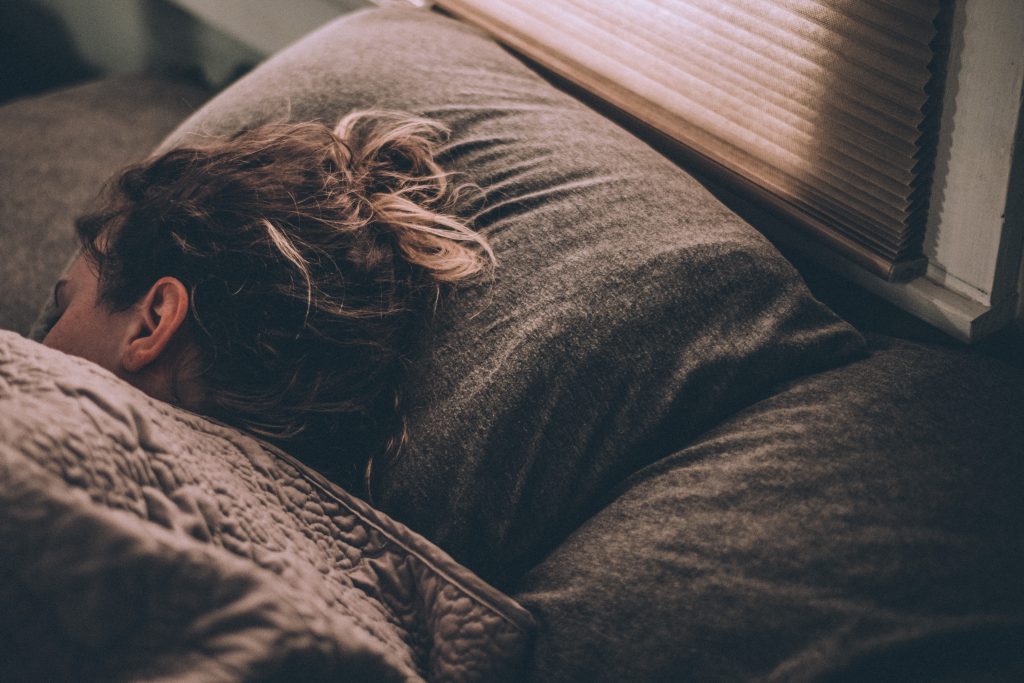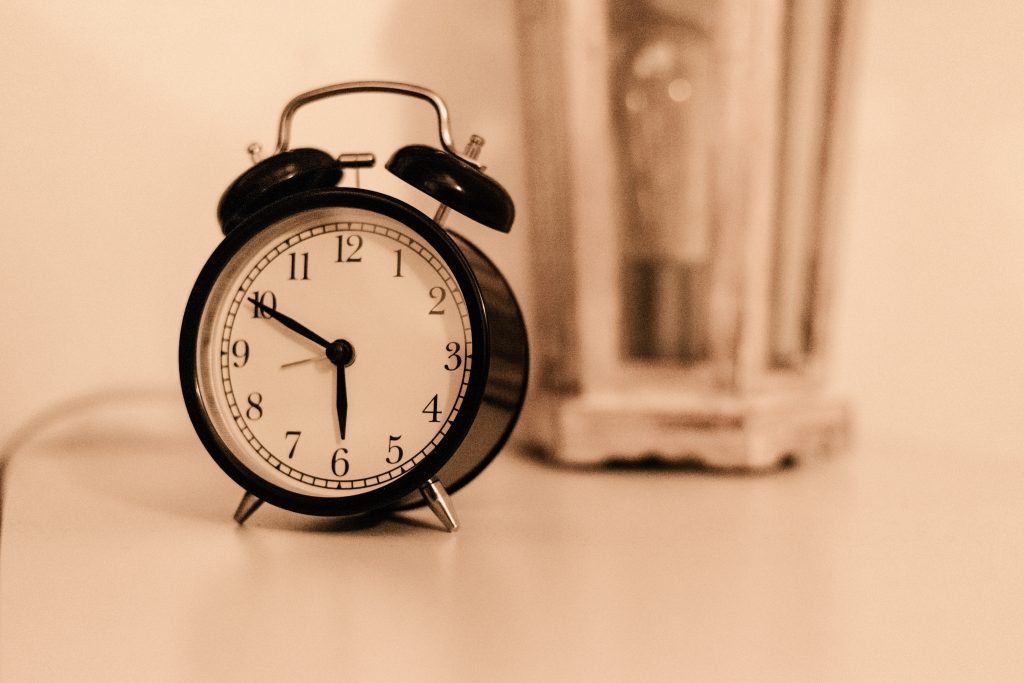
Mood disorders, including depression, are common and a major cause of disability and suffering worldwide. Many symptoms have been associated with the syndrome of depression (Fried, 2017) including psychological symptoms like low mood, lack of enjoyment in life or feelings of guilt or hopelessness, and physical symptoms including changes to appetite and weight and difficulties sleeping.
Sleep is a behaviour that seems to be fundamental to health; almost all animals do it (Siegel 2022), and many vital biological functions have been ascribed to sleep including memory consolidation, metabolic and immune functions, as well as general associations with mental health and wellbeing. Evidence from large studies like the UK Biobank even suggests that people who get too much or too little sleep are more likely to have mental health problems (Wainberg et al. 2021) and develop cardiovascular disease and cancer (Tao et al. 2021).
Putting those pieces together, mood disorders also often involve changes in sleep and sleep is related to health, including mental health. However, it is less clear if there is a causal relationship between these observations:
Does poor sleep cause depression?
These questions can be hard to disentangle. One way to try to clarify any causal associations is to measure a person’s genetic predispositions to a particular trait, then correlate that predisposition (known as a polygenic risk score) with phenotypes (one’s observable traits e.g., eye colour) observed later in life. Hamilton et al embark on such a study (Hamilton, Steptoe, and Ajnakina 2023), asking if genetic predisposition for altered sleep is linked to later life depression. Importantly, they also reverse the question: is a higher genetic predisposition to depression linked to poor sleep later in life?

Sleep is fundamental to both our mental and physical health, but does poor sleep cause depression?
Methods
The authors used data from a large cohort study (n = 7,146), the English Longitudinal Study of Aging (ELSA), which followed up participants aged over 50 for an average period of 8 years. Data collected from participants included a sample processed for genetic analysis and psychiatric questionnaires administered approximately every 2 years.
The authors used published Genome Wide Association Study (GWAS) summary statistics to calculate polygenic risk scores (PRS) for sleep duration, short-sleep (sleeping less than 5 hours per night) and long-sleep (greater than 9 hours per night) traits, which acted as exposures in the study (Dashti et al. 2019; Jansen et al. 2019). They also calculated a PRS for depression (Wray et al. 2018). In total 179,780 genetic variants were used to create the PRS. You can read more about polygenic risk scores in this recent Mental Elf blog on Tourette Syndrome (Palmer, 2023). Additional exposures were self-reported sleep durations measured by questionnaire.
The main outcome was “subclinical depression”, measured via a modified version of the Centre for Epidemiologic Studies Depression Scale (a score greater than or equal to 4 out of 7 counted as “subclinical depression”). Covariates were included in adjusted models: age (and age squared), sex, and genetic ancestry as measured using principal components from their genetic analysis.
Results
In the set of participants used in the main analyses, the average age was 65 years, at baseline participants were sleeping on average 6.97 hours a night: 10.47% had “short sleep” (less than 5 hours per night), 4.49% had “long sleep” (more than 9 hours per night) and 15.27% self-reported having depression.
The main finding of the study was that a higher genetic risk score for short sleep was associated with increased odds of incident depression over the follow-up period of this cohort study. Specifically, a one standard deviation (SD) increase in PRS for short sleep was associated with higher odds of incident depression over the average of 8 years of follow-up (odds ratio 1.14, 95% confidence interval of 1.03 to 1.25). Odds ratios can be hard to interpret in isolation. Using the author’s baseline percentage of participants with depression (15.27%) we can convert the odds ratio into an absolute risk change: the author’s results mean that a 1 SD change in short sleep PRS is associated with an 1.8% change in the absolute risk of depression.
By contrast, higher genetic risk scores for sleep duration (odds ratio 0.92, 95% CI 0.84 to 1.00) or long sleep (odds ratio 0.97, 95% CI 0.89 to 1.06) were not associated with higher risk of incident depression. In the reverse analysis where the authors investigated whether PRS for depression changed risk of altered sleep, they did not find any significant relationships.
In sensitivity analyses, the authors found that expressed sleep problems (rather than genetic risk scores) were also associated with depression: longer sleep duration was associated with lower odds of incident depression, whereas both short sleep and long sleep were associated with higher odds. Like their genetic findings, the authors found that depressive symptoms at baseline were not associated with changes in sleep at future measurement points.
The authors conducted a set of additional sensitivity analyses to explore the robustness of their findings, including adding additional socioeconomic and environmental variables to their models; and exploring the effect of varying their statistical methods, including the impact of using a continuous depression score, and of imputing missing values. The findings of these additional analyses supported the author’s main results.

Higher genetic risk for short sleep (less than 5 hours per night) was associated with increased odds of incident depression.
Conclusions
The authors concluded that they observed an association between genetic predisposition towards a short duration of sleep and expressed short sleep (less than 5 hours per night) and incident depression in their sample of older adults. By contrast, increased genetic risk for depression was not associated with increased risk of developing sleep problems in their sample.

The genetic mechanisms that lead to short sleep are associated with depression.
Strengths and limitations
The key strengths of this paper include:
- The use of data from a large cohort study, giving power to the author’s statistical analysis (i.e. the ability to correctly detect a true effect if present) and which is open source. This means other investigators can access it and perform their own analysis (http://doi.org/10.5255/UKDA-Series-200011).
- The use of genetic summary data from large, well-established studies to calculate their PRS measure.
There are some important limitations to consider when interpreting the results of this study. First, it is worth considering that, although statistically significant (meaning these results are unlikely to have occurred if there truly was no association between the PRS and incident depression), the odds ratio of the main finding was 1.14. This is equivalent to a small change in absolute risk of depression (<2%). The absolute impact of sleep PRS on depression may be small. In comparison, for example, in older adults with recent bereavement (odds ratio 3.3), subjective sleep disturbance (OR 2.6), physical disability (OR 2.5), prior depression (OR 2.3) and female gender (OR 1.4) have been noted to have much larger odds ratios for depression than the sleep PRS associations in the present study (Cole and Dendukuri 2003).
The authors focus on the onset of sleep problems and incident depression later in life, when PRS are fixed and lifelong (presumably). They point to evidence that sleep phenotypes tend to be stable across the lifespan. It is therefore unclear, why a PRS for depression, or sleep (which ought to be fixed), would be associated with new later life sleep or mood changes specifically. This complexity limits the interpretation of their findings to a rather specific set of circumstances in later life.
I wonder how the relationship between (genetic predisposition for) short sleep and depression changes across the lifespan. For example, the analyses presented leave open the question of how earlier experiences of poor sleep and depression might influence later life depression. The more episodes of depression a person has, the more likely they are to have further episodes (Burcusa and Iacono 2007). The authors did not take previous episodes of depression into account in their analysis, which limits interpretations of causality in their findings. As sleep problems associate with affective disorders at all ages, this is an important question for future studies.
The authors note in their discussion that the analysis did not consider medications use. Hypnotic medications are commonly prescribed, as are antidepressant medications, and it is not uncommon in UK primary care for antidepressant medications (e.g. amitriptyline and mirtazapine) to be prescribed as hypnotics. These can have profound impacts (both subjectively and objectively) on sleep, and could represent an important source of confounding, at least in a subset of patients. For example, short sleep PRS increases chances of medications being prescribed, which could then have an impact on mental health; conversely a higher depression PRS could increase the chance of antidepressant being prescribed, which changes sleep.

This paper leaves open the question of how earlier experiences of poor sleep and depression might influence later life depression.
Implications for practice
What do the findings in this study tell us? As a clinician, my experience is that problems with sleep are very common, often coming near the top of a list of problems that a patient might describe. It is therefore informative to know that short sleep specifically might be a risk factor for the onset of depression; this information could be useful for planning treatment with patients or thinking about future risks.
That said, the absolute change in risk found was small, and we do not routinely calculate polygenic scores; instead, we rely on self-report. It is informative in this regard that expressed short sleep phenotype was associated with depression.
An important extension of the study would be to explore the generalisability of the findings to other age groups. For example, is genetic risk of short sleep associated with incident depression in adolescents and younger adults, who are more likely not to have had an episode of depression before (in contrast to the older adults in the current study)?
It would also be very useful to know if interventions on sleep (particularly on short sleep or those people with high PRS for poor sleep who might be identified as “high risk”) could reduce future depression. One useful and evidence-based intervention for insomnia (a subjective persistent sleep deficit, so not necessarily the same as short sleep, as we do not know if the participants were troubled by having short sleep) is Cognitive Behavioural Therapy for Insomnia (CBTi).
There is some evidence that CBTi (which can be delivered in app/computerised formats) can improve both sleep and depression/anxiety symptoms (Chan et al. 2023). One interesting future direction might therefore be to test if CBTi in older adults can increase sleep duration in short sleepers, and whether that change could decrease the chance of depression.

Knowing that short sleep might be a risk factor for the onset of depression is very valuable for planning treatment with patients or thinking about future risks.
Statement of interests
I have no personal or professional links to this study, and no conflicts of interest to declare.
Links
Primary paper
Hamilton, Odessa S., Andrew Steptoe, and Olesya Ajnakina. 2023. “Polygenic Predisposition, Sleep Duration, and Depression: Evidence from a Prospective Population-Based Cohort.” Translational Psychiatry 13 (1): 1–7. https://doi.org/10.1038/s41398-023-02622-z
Other references
Burcusa, Stephanie L., and William G. Iacono. 2007. “Risk for Recurrence in Depression.” Clinical Psychology Review 27 (8): 959–85. https://doi.org/10.1016/j.cpr.2007.02.005.
Chan, Christian S., Christy Y. F. Wong, Branda Y. M. Yu, Victoria K. Y. Hui, Fiona Y. Y. Ho, and Pim Cuijpers. 2023. “Treating Depression with a Smartphone-Delivered Self-Help Cognitive Behavioral Therapy for Insomnia: A Parallel-Group Randomized Controlled Trial.” Psychological Medicine 53 (5): 1799–1813. https://doi.org/10.1017/S0033291721003421.
Dashti, Hassan S., Samuel E. Jones, Andrew R. Wood, Jacqueline M. Lane, Vincent T. van Hees, Heming Wang, Jessica A. Rhodes, et al. 2019. “Genome-Wide Association Study Identifies Genetic Loci for Self-Reported Habitual Sleep Duration Supported by Accelerometer-Derived Estimates.” Nature Communications 10 (1): 1100. https://doi.org/10.1038/s41467-019-08917-4.
Fried, Eiko I. 2017. “The 52 Symptoms of Major Depression: Lack of Content Overlap among Seven Common Depression Scales.” Journal of Affective Disorders 208 (January): 191–97. https://doi.org/10.1016/j.jad.2016.10.019.
Jansen, Philip R., Kyoko Watanabe, Sven Stringer, Nathan Skene, Julien Bryois, Anke R. Hammerschlag, Christiaan A. de Leeuw, et al. 2019. “Genome-Wide Analysis of Insomnia in 1,331,010 Individuals Identifies New Risk Loci and Functional Pathways.” Nature Genetics 51 (3): 394–403. https://doi.org/10.1038/s41588-018-0333-3.
Palmer, E. Genetic risk for Tourette Syndrome and related conditions. The Mental Elf, 23 November 2023
Siegel, Jerome M. 2022. “Sleep Function: An Evolutionary Perspective.” The Lancet. Neurology 21 (10): 937–46. https://doi.org/10.1016/S1474-4422(22)00210-1.
Tao, Fengran, Zhi Cao, Yunwen Jiang, Na Fan, Fusheng Xu, Hongxi Yang, Shu Li, et al. 2021. “Associations of Sleep Duration and Quality with Incident Cardiovascular Disease, Cancer, and Mortality: A Prospective Cohort Study of 407,500 UK Biobank Participants.” Sleep Medicine 81 (May): 401–9. https://doi.org/10.1016/j.sleep.2021.03.015.
Wainberg, Michael, Samuel E. Jones, Lindsay Melhuish Beaupre, Sean L. Hill, Daniel Felsky, Manuel A. Rivas, Andrew S. P. Lim, Hanna M. Ollila, and Shreejoy J. Tripathy. 2021. “Association of Accelerometer-Derived Sleep Measures with Lifetime Psychiatric Diagnoses: A Cross-Sectional Study of 89,205 Participants from the UK Biobank.” PLoS Medicine 18 (10): e1003782. https://doi.org/10.1371/journal.pmed.1003782.
Wray, Naomi R, Stephan Ripke, Manuel Mattheisen, Maciej Trzaskowski, Enda M Byrne, Abdel Abdellaoui, Mark J Adams, et al. 2018. “Genome-Wide Association Analyses Identify 44 Risk Variants and Refine the Genetic Architecture of Major Depression.” Nature Genetics 50 (5): 668–81. https://doi.org/10.1038/s41588-018-0090-3.
Photo credits
- Photo by Sander Sammy on Unsplash
- Photo by Gregory Pappas on Unsplash
- Photo by Julian Hochgesang on Unsplash
- Photo by Sangharsh Lohakare on Unsplash
- Photo by Kinga Howard on Unsplash
- Photo by Nik on Unsplash
